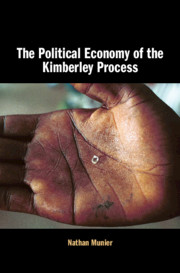Book contents
- The Political Economy of the Kimberley Process
- The Political Economy of the Kimberley Process
- Copyright page
- Contents
- Tables
- Acknowledgments
- 1 Diamonds after Blood?
- 2 The Domestic Political Economy of International Agreements
- 3 From Passiveness to the Presidency
- 4 Diamonds, Dependence, and De Beers
- 5 The One Who Controls the Diamond Wears the Crown
- 6 The Limits of Cooperation after Conflict?
- 7 No Private Companies = No Compliance
- 8 Understanding the Nature of the Kimberley Process and International Agreements
- Works Cited
- Index
4 - Diamonds, Dependence, and De Beers
Monopoly Capitalism and Compliance with the Kimberley Process in Namibia
Published online by Cambridge University Press: 20 August 2020
- The Political Economy of the Kimberley Process
- The Political Economy of the Kimberley Process
- Copyright page
- Contents
- Tables
- Acknowledgments
- 1 Diamonds after Blood?
- 2 The Domestic Political Economy of International Agreements
- 3 From Passiveness to the Presidency
- 4 Diamonds, Dependence, and De Beers
- 5 The One Who Controls the Diamond Wears the Crown
- 6 The Limits of Cooperation after Conflict?
- 7 No Private Companies = No Compliance
- 8 Understanding the Nature of the Kimberley Process and International Agreements
- Works Cited
- Index
Summary
This chapter examines Namibia, the state with the highest level of compliance in the study. Also, this case is the clearest example of compliance with the Kimberley Process being a reflection of diamond dependence, specifically the Namibian government’s longstanding dependence on De Beers. Other companies have tried to enter the Namibian market, but the Kimberley Process has played an essential role in creating a regulatory environment within Namibia that is advantageous to De Beers. The relationship between De Beers and SWAPO largely explains why the state has mainly complied and cooperated with the Kimberley Process since it was implemented, whereas other comparable alluvial diamond producers in sub-Saharan Africa have had difficulty complying.
- Type
- Chapter
- Information
- The Political Economy of the Kimberley Process , pp. 78 - 94Publisher: Cambridge University PressPrint publication year: 2020

